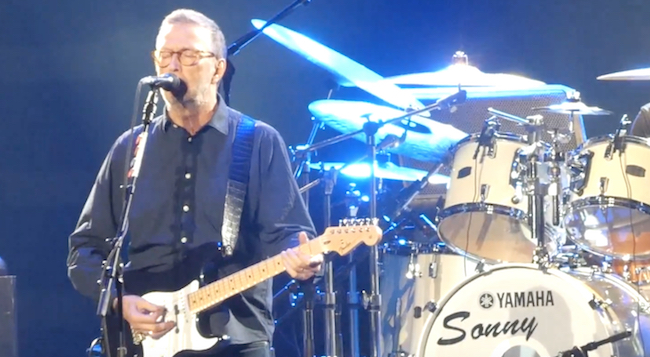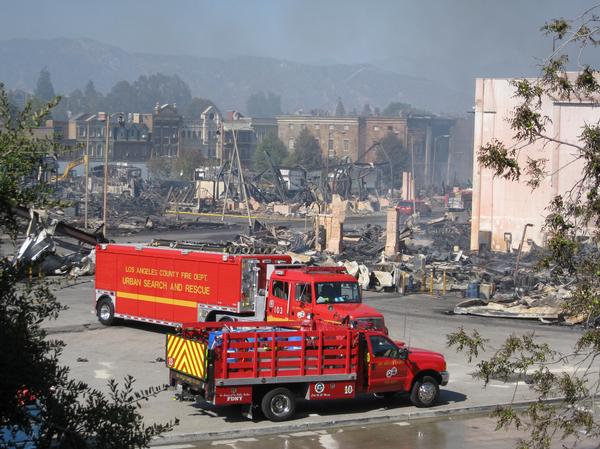
The original master tapes of music recorded by Elton John, Peter Frampton, the Police, Janet Jackson, Nirvana, and many more, were lost in a 2008 fire at Universal Studios Hollywood. The news was originally revealed in an article published June 11, 2019, in the New York Times. The story noted the destruction of thousands of master recordings by some of the greatest artists in history. The fire was reported at the time to have destroyed the theme park’s King Kong attraction and a vault containing only copies of old videos.
The loss of the audio recordings was largely unknown at the time, said the report, written by Jody Rosen. A class action suit was filed against Universal Music Group on behalf of many of the affected artists.
However, in court documents revealed on Feb. 13, 2020, UMG now claims that recordings by “only” 19 artists were destroyed in the fire. Besides those noted above, UMG’s filing also mentions such artists as Bryan Adams, Beck, Sheryl Crow, R.E.M., Slayer, and Soundgarden, among others.
Rolling Stone quotes Howard King, a lawyer representing one of the artists behind the class action suit. “Universal claimed 17,000 artists were affected by the fire when they were suing for damages,” he said. “Now that they face a lawsuit by their artists, they claim a mere 19 artists were affected. This discrepancy is inexplicable.”
In its reporting, The Hollywood Reporter quotes UMG lawyers as saying, “UMG remains committed to providing transparency to inquiring artists. But Plaintiffs’ demand that the effort be broadened to nearly 17,000 artists would impose an extraordinary and impermissible burden on UMG.”
That would “require a substantial diversion of UMG’s workforce” and would “ultimately take years to complete.”

In the Times‘ original 2019 story, recordings lost in the fire are said to have included original recordings made for such labels as Chess, Decca, MCA, ABC, A&M, Geffen and Interscope. Said to be lost were historical recordings by such artists as Duke Ellington, Louis Armstrong and Ella Fitzgerald, as well as rock, blues and R&B artists such as Chuck Berry, Aretha Franklin, Bo Diddley, Howlin’ Wolf and Etta James. Masters of Bill Haley and the Comets’ “Rock Around the Clock” and the Kingsmen’s “Louie Louie,” according to the article.
[The Kingsmen have stated that the master recording of “Louie Louie” was not lost. “Unless someone removed the masters from our vault in Washington, they are still there,” said Norm Sundholm of Kingsmen International Licensing, Inc.]
Masters for both singles and albums were destroyed. The Times’ lengthy list of masters affected includes dozens of recordings by major artists, ranging from Ray Charles and B.B. King to Eric Clapton, Lynyrd Skynyrd, Cat Stevens, Steely Dan, and the Eagles.
Virtually all of the masters by Billie Holiday and Buddy Holly were lost, said the original Times report.
According to the report, the fire took place on June 1, 2008, first engulfing a film set featured in Back to the Future and the King Kong Encounter. It then spread to a building known as Universal’s video vault, which also contained the audio masters owned by Universal Music Group (UMG). The intense fore caused devastating damage, the extent of which was largely unreported at the time. Although one news source did report the loss of thousands of master recordings, the Universal conglomerate did quick damage control to downplay the fire’s impact on its music holdings.
Said the Times, there were many masters “for largely forgotten artists that were stored in the vault: tens of thousands of gospel, blues, jazz, country, soul, disco, pop, easy listening, classical, comedy and spoken-word records that may now exist only as written entries in discographies.”
In addition to the familiar recordings lost in the fire, also gone were many previously unreleased recordings. A confidential memo unearthed by the Times put the number at 118,230 lost recordings in all, although the actual number might have been closer to 175,000. The likely number of song titles affected, in all, is said to have been more than half a million.
On June 11, 2019, Universal Music issued a statement disputing the severity of the loss. In part it said that the Times report contained “numerous inaccuracies, misleading statements, contradictions and fundamental misunderstandings of the scope of the incident and affected assets.” Read the corporation’s statement here.
[easy_sign_up title=”Sign up for the Best Classic Bands Newsletter”]

